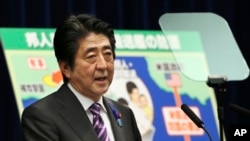Japan used an annual defense paper on Tuesday to issue a fresh warning about what it sees as China's destabilizing actions in the region.
The so-called white paper expressed particular concern about China's "profoundly dangerous" declaration of an Air Defense Identification Zone in a part of the East China Sea that includes islands also claimed by Japan.
The paper, which was adopted Tuesday by the Cabinet, said the identification zone is an attempt by China to "unilaterally change the status quo, escalate the situation, and may cause unintended consequences."
In what many see as a response to China's actions, Japanese Prime Minister Shinzo Abe has sought to expand the regional role of his country's military.
Temple University Asian Studies professor Jeffrey Kingston says he sees the white paper as focused on a domestic audience.
"The big problem for Prime Minister Abe is that the public is totally opposed to him ramping up Japan's security posture," he said. "His decision at the beginning of July to reinterpret Article 9 of the constitution to make it possible to for Japan to engage in what they call "collective self-defense," is opposed vigorously by most Japanese."
Several of China's neighbors have accused Beijing of using similar aggressive tactics to forcibly advance its disputed maritime claims in the nearby South China Sea.
Those disputes are expected to be a major topic of discussion at an upcoming summit of ASEAN foreign ministers in Myanmar, also known as Burma.
Speaking to reporters in Washington Monday, Assistant Secretary of State Daniel Russel said Secretary of State John Kerry will urge China and its neighbors to agree to voluntarily refrain from destabilizing actions in the South China Sea.
"It can range from very modest steps, steps that have already been agreed to by all the claimants, such as an agreement not to seize currently unoccupied land features. Or it could include more significant steps, such as a moratorium on the reclamation work that several claimants have under way to add land to the features that they are currently occupying," said Russel.
China has repeatedly taken assertive steps to enforce its claims to nearly the entire South China Sea, rattling rival claimants, including Vietnam, the Philippines, Taiwan, Malaysia and Brunei.
China has already rejected such a proposal, saying it is within its rights to carry out such activities in what it views as its territory.
Russel, the top U.S. diplomat for East Asia, said Kerry will also push China to make progress with ASEAN on a long-delayed Code of Conduct to help regulate activities and lessen tensions in the South China Sea.
China is reluctant to discuss its territorial disputes at bilateral forums such as ASEAN. It instead prefers to deal with each claimant individually, a position that gives it considerably more clout.
Beijing recently withdrew an oil rig from an area also claimed by Vietnam, bringing an end to months of heightened tensions and small-scale sea clashes.
Russel said China's withdrawal of the rig removed a serious irritant, but strained China-Vietnam ties, left a legacy of anger, and raised "serious questions" about China's long-term strategy.





